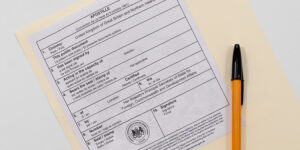What is a company registration number?
The company registration number is a unique string of eight characters assigned to a company during the incorporation process. Its purpose is to identify the company and verify that it has been incorporated at Companies House as a legal entity (i.e., a ‘legal person’ in its own right).
The company registration number is also referred to as a ‘company number’, a ‘Companies House registration number’, a ‘registered number’, or simply a ‘CRN’. It is automatically generated and allocated by Companies House, so you cannot choose it or change it.
How do I find my company registration number (CRN)?
You can find your CRN in a variety of places, including:
- The certificate of incorporation issued by Companies House to companies upon incorporation.
- Letters, emails, and other statutory documentation received from Companies House
- Online, within your company listing on the official public register of company information, via Companies House Service
- Most company-related correspondence received from your accountant or company formation agent (if applicable)
- Through 1st Formations free Online Company Manager – you can register a free account with us, even if you’re not a client
- On a change of name certificate, if you have changed your company name after incorporation
To find your company registration number online, simply visit Companies House Service, type the full company name into the search box, and click on the search icon.
Your company listing will appear in the results, with the registration number displayed underneath. If you want to view your full company record, click on your company name.
Company registration number formats
A CRN consists of 8 figures (numbers) or 2 letters followed by 6 figures. The exact combination depends on the company structure and where it is incorporated.
Limited companies incorporated in England & Wales are always assigned 8-figure CRNs. In Scotland, company registration numbers contain 6 figures, prefixed with the letters ‘SC’.
In Northern Ireland, CRNs contain 6 numbers, with the prefix ‘NI’. However, older Northern Irish companies formed pre-partition have the alphanumeric prefix ‘R0’, followed by 6 additional numbers.
Take a look at the table below for some examples of different company registration number formats.
| Jurisdiction of incorporation | Company type | Example CRN format |
| England & Wales, or Wales only | Limited company
Limited liability partnership Limited partnership |
01234567
OC123456 LP123456
|
| N. Ireland | Limited company (post-partition)
Older (pre-partition) companies Limited liability partnership Limited partnership |
NI123456
R0123456 NC123456 NL123456
|
| Scotland | Limited company
Limited liability partnership Limited partnership |
SC123456
SO123456 SL123456 |
Other company registration number formats also exist for more specialist types of companies and organisations, such as assurance, investment, Royal Charter, and foreign companies.
Who needs a company registration number?
Only businesses and organisations incorporated or registered at Companies House are provided with a company registration number.
This includes companies limited by shares, companies limited by guarantee, public limited companies (PLCs), limited liability partnerships (LLPs), and limited partnerships (LPs).
Do sole traders and partnerships need a company registration number?
Sole traders and ordinary (general) business partnerships do not need a company registration number, because they are not required to register or incorporate at Companies House.
Unlike companies, these business structures are not legal entities with separate identities from their owners, nor are their details a matter of public record. Instead, sole traders and ordinary partnerships register only with HMRC and are taxed through Self Assessment.
When does a company registration number need to be used?
There are many occasions when you will need to use or provide your CRN, which we outline below.
Dealing with Companies House
- Filing and updating a confirmation statement (previously the annual return)
- Preparing annual accounts
- Changing the company’s accounting reference date (ARD)
- Updating your company information, including
- changing the company name
- changing the registered office address
- registering a SAIL address or changing an existing one
- moving statutory records from the registered office to a SAIL address, or vice versa
- electing to keep statutory registers at Companies House instead of at the registered office or SAIL address
- reporting new appointments or resignations of company officers (i.e., directors, company secretaries, LLP members)
- changing the registered details of existing officers
- changes to ‘people with significant control’ (PSC) information
- altering the articles of association
- Filing copies of company resolutions
- Issuing new shares, or transferring existing shares
- Updating information relating to company mortgages (‘charges’)
- Winding up (closing) the company
Dealing with HM Revenue & Customs (HMRC)
- Registering for business taxes, including Corporation Tax, VAT, and Pay As You Earn (PAYE)
- Filing Company Tax Returns, VAT Returns, and PAYE reports
- Paying company taxes, including Corporation Tax, VAT, and Income Tax and National Insurance contributions through PAYE
- Registering for the Construction Industry Scheme (CIS)
- Reporting a dormant trading status
General company administration
- Setting up a business bank account
- Applying for a business loan, credit account, or lease in the company name
- Creating share certificates
- Creating dividend vouchers
- Designing company stationery and promotional material
Additionally, you may need to provide your CRN when making any other company-related enquiries to Companies House, HMRC, the courts, other government departments or bodies, and any institutions or businesses with whom your company has official dealings, such as suppliers and service providers.
Is a company registration number the same as a company tax number?
This is a common misconception, but a company registration number is not the same as a company tax number.
CRNs are issued by Companies House as unique identifiers for individual companies on the public register, whereas company tax numbers are unique 10-digit codes that HMRC assigns to companies to track their tax records.
Officially, a company tax number is referred to as a company’s Unique Taxpayer Reference, or ‘UTR’. Sometimes, it will simply be called a ‘tax number’ or ‘tax reference’.
- Is my company number the same as my tax number?
- Guide to Tax Identification Numbers (TINs) in the UK
You don’t have to apply for one – HMRC is notified by Companies House when new companies are formed. So, your company’s UTR will be automatically generated and sent to your registered office a few weeks after incorporation.
Likewise, do not confuse your company registration number with your VAT number, employer PAYE reference number, Government Gateway User ID, company authentication code, or any other number or reference that your company may be provided with.
Where does the registration number need to be displayed?
In accordance with The Company, Limited Liability Partnership and Business (Names and Trading Disclosures) Regulations 2015, which sets out corporate transparency and disclosure requirements, companies (which includes LLPs and LPs) must display their CRN on business letters, order forms, and websites.
Specifically, this means that you are legally required to show your CRN on the following forms of official company stationery, correspondence, and promotional material:
- Letterheads
- Emails
- Faxes
- Order forms
- Compliments slips
- Leaflets and flyers
- Catalogues
- Advertisements
- Websites and any other online material
This disclosure requirement applies irrespective of whether the aforementioned communications are presented in hard copy, electronic, digital, or any other form.
The company registration number – and all other details that fall under the purview of company disclosure requirements – does not have to be displayed on every page of a document or website. However, it must be easy to find and visible to the naked eye.
The purpose of these regulations is to ensure that anyone who has (or may wish to have) dealings with a particular company is able to verify the legal identity of that company.
The company and its officers can be fined if they fail to comply with these disclosure requirements.
Will I get a new registration number if I change my company name?
There will be no change to your CRN if you change your company name. It remains the same for the entire lifetime of the company.
You will simply receive a ‘certificate of incorporation on change of name’ from Companies House. This document will show the old and new company names, the company registration number, and the date of the change.
This certificate does not replace your original certificate of incorporation, so you must retain both documents with your company records.
What happens if I lose my company registration number?
If you forget or lose your company registration number, there’s no need to worry. You can find it in any of the places outlined at the beginning of this post, including:
- The certificate of incorporation
- Statutory mail received from Companies House and HMRC
- Online via Companies House Service
- 1st Formations free Online Company Manager
Our Online Company Manager service is available to clients and non-clients alike.
- Existing customers can simply enter their login details to access their company data, including their company registration number
- Non-clients can create an account free of charge, import an existing company and manage it online
You can access this free facility at any time to view and update your company details, download company documents, report changes to Companies House, and much more.
Please note that the information provided in this article is for general informational purposes only and does not constitute legal, tax, or professional advice. While our aim is that the content is accurate and up to date, it should not be relied upon as a substitute for tailored advice from qualified professionals. We strongly recommend that you seek independent legal and tax advice specific to your circumstances before acting on any information contained in this article. We accept no responsibility or liability for any loss or damage that may result from your reliance on the information provided in this article. Use of the information contained in this article is entirely at your own risk.











Join The Discussion
Comments (10)
Why two different companies have same CRN ? Or it is scammers?
Hi Elen,
Thank you for your comment.
Company Registration Numbers are unique and no two companies will share a CRN. If you suspect any wrongdoing, we would suggest for you to go directly to Companies House to resolve.
Do let us know if you have any additional queries.
Kind regards,
The 1st Formations Team
good day! tell me, are the numbers in the identifier random or do they depend on some reason?
Thank you for your kind enquiry, Xenia. The numbers are generated on a one by one basis, so if company X was formed it would have a number, and company Y was the next company in the UK formed it would have the same number with ‘1’ added to it. The number is simply a unique identifier for a company and has there is no meaning that can be derived by a company registration number.
We trust this information is useful to you.
Kind regards,
The 1st Formations Team
Hello, please help the company number given to me online isn’t my address I’m afraid someone has confused my identity without someone else’s, doesn’t make sense. Thanks
Thank you for your message, Emma.
If you formed the company through 1st Formations, please give us a call on 020 3897 2233, and our Customer Service Team will be able to help you. If you did not form your company through 1st Formations, I would recommend you call Companies House Customer Service Team on 0303 123 4500, and they should be able to help you.
Kind regards,
John Carpenter
I have a utr number is this registration number for business account or do I need to set up a LTD account
Hi Paul,
Your UTR (Unique Taxpayer Reference) is a reference number every company receives fro HMRC for tax identification purposes. You’ll need it when paying your company’s tax bill, or when making enquiries with HMRC pertaining to your company’s tax. The UTR should not be confused with a business bank account, which a company will need to set up separately.
Kind regards,
John Carpenter
need company registration number
Hello there,
If you have set up a limited company, you will find your registration number on the certificate of incorporation issued by Companies House. You can also find the number online by searching for your company name here: https://beta.companieshouse.gov.uk
If you do not have a company, you won’t have a registration number – you will have to incorporate a company in order to get one. You can find out how to do this here: https://www.gov.uk/limited-company-formation/overview
I hope that answers your question but please get back in touch if you need more help or clarification!
All the best,
Rachel